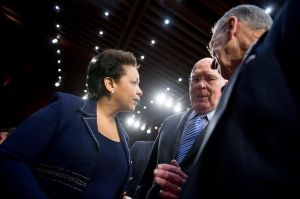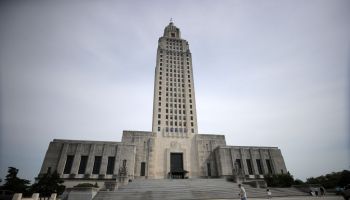
Source: Photo by Andrew Harnik for The Washington Post via Getty Images
What do an anti-trafficking bill with the Hyde Amendment to prevent federal dollars being spent on abortions and Loretta Lynch have to do with each other?
If you are thinking it’s a trick question, you might be right. While in reality, Loretta Lynch, the twice confirmed United States Attorney for Eastern New York and nominee for the post of the Attorney General and the anti-trafficking bill have no real connection, in a dramatic, almost soap opera-like turn of events, they have become seemingly inextricably linked. It has been over five months since Loretta Lynch has been nominated in a historic way – becoming the first Black woman to ever receive the nomination to lead the nation’s top law enforcement agency, and yet, the vote to confirm her has been stalled. Widely regarded as a phenomenally qualified woman and with no real blemish on her record, many people thought her nomination would be wrapped up quickly. But the joke was on us.
When Loretta Lynch was nominated by President Obama to replace the last historic Attorney General, Eric Holder, she was donned “the least controversial of the final choices before the president,” as reported in the Washington Post. Her handling of several notable cases was thought to be professional and fair. However, when she was pressed about the president’s authority to address immigration using executive orders during her confirmation hearing, her answers were less than pleasing to Senate Republicans, who disagreed with the president’s actions. Her response stating, based on what she read, the president acted within his rights was not the answer the senators were looking to hear and many of them decided that she was an unfit candidate. However, since that time, several Republicans both inside and outside of the senate have given her their support.
But there still has not been any movement toward a vote.
In January, when an anti-human-trafficking bill was introduced and later revealed to have the Hyde Amendment language in it, Senate Democrats decided to filibuster the bill to prevent the language from passing. Either in retaliation or response, Senate Republicans then refused to call a vote on the Lynch nomination. But that doesn’t mean they haven’t confirmed anyone. Just this week, they confirmed a U.S. District Judge unanimously. And while the childish tit-for-tat behavior that has devolved into what we have come to know as politics is an issue, it’s not an issue that Loretta Lynch should have to bear.
This week, Congress returned from break. While many were hoping that a vote would be called early in the week, several groups came together to host actions on Wednesday. Included in those strategic actions was the #ConfirmLynchFast, a play on words admonishing the Senate to confirm Ms. Lynch quickly and calling on supporters to fast in protest to the stall of her confirmation. Since then, organizations and individuals have joined the national effort, using their meal time as an opportunity to call or tweet senate members and ask them to call a vote. The question has been, why a fast? But when other strategies have been attempted and there still has been no progress, the goal is to pull on the heartstrings and humanity of senators. Whether one day a week or everyday until the vote is called, people have decided to give up their meals in order to show solidarity to the cause of fairness. There is no justice found in tying Loretta Lynch’s confirmation to an unrelated bill. There is no justice in making a qualified candidate wait longer than the last seven nominees for the same position. But Loretta Lynch should be in the Department of Justice as the Attorney General. It’s up to us to make sure the United States Senate knows it’s time to #ConfirmLynchFast.
Janaye Ingram is the National Executive Director of National Action Network (NAN) and oversees NAN’s action agenda and legislative advocacy work under Founder and President, Rev. Al Sharpton. In this role, Ingram focuses on issues such as education, criminal justice, housing, technology, economic development and healthcare, among others.
























